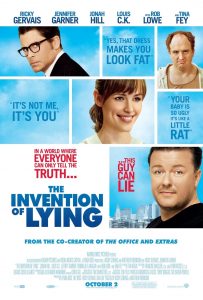 I know that October isn’t really the right time of year to watch comedies. I mean, it’s really a pretty straightforward process. October and February are for horror, November is for family movies and James Bond, December is for OMG-Drama, spring (and September? I’m not entirely sure where September fits) are for comedy, summer is for action blockbusters, and January is for movies that honestly shouldn’t ought to have been released. But, okay, Hollywood doesn’t always do the right thing, and also sometimes I am in the company of people who have an aversion to this or that type of movie. In this instance, despite there being a couple-few horror movies left for me to catch up on for the month, I ended up seeing The Invention of Lying.
I know that October isn’t really the right time of year to watch comedies. I mean, it’s really a pretty straightforward process. October and February are for horror, November is for family movies and James Bond, December is for OMG-Drama, spring (and September? I’m not entirely sure where September fits) are for comedy, summer is for action blockbusters, and January is for movies that honestly shouldn’t ought to have been released. But, okay, Hollywood doesn’t always do the right thing, and also sometimes I am in the company of people who have an aversion to this or that type of movie. In this instance, despite there being a couple-few horror movies left for me to catch up on for the month, I ended up seeing The Invention of Lying.
Imagine, if you can, a world in which humans never learned how to lie. I mean, not about anything. They don’t even have that polite society filter that keeps them from saying whatever crosses their minds. And Ricky Gervais is one of this world’s losers, near the bottom of the genetic lottery, and almost out of job prospects despite talent, because of nothing more than unfortunate luck. And in this moment of disaster, a neuron fires in a way that has never happened before, and he, y’know, invents lying. Next thing you know, he has achieved fiction and religion, not to mention a ton of cash, yet despite all his efforts, he cannot win what he wants most of all: the love of Jennifer Garner. The rest, well, romantic comedy, I guess? Will he learn a valuable lesson, will it come too late, etc.
And you know, it was funny, and it was sweet, just as you’d expect. It was even funny for a regular funny movie, so quite a bit moreso than the usual romantic comedy. (It may have been sweeter than usual too, but as I had been rendered tipsy earlier in the evening, I do not fully trust my opinion on that matter.) The one thing I didn’t like was the religious angle, because it seemed, well, a little cruel. I mean, in the movie it wasn’t at all, but there was still this underlying snicker, like even though Ricky Gervais isn’t a jerk, probably whoever invented religion the first time was. And I figure that as many good religious people as there are, it didn’t have to be that way at the start. My headspace on this point may be all jumbled, I admit. It’s not like I disagree with the underlying point at all, I just don’t think it needed to be mean. So, there’s that?
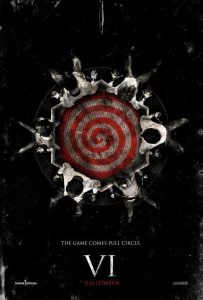 There are, aside from
There are, aside from 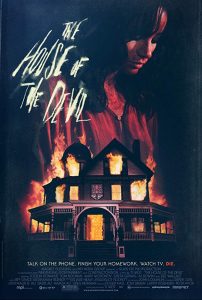 I would ask why all my favorite movie stories happen at the Alamo Drafthouse, but I know why: because it’s the kind of place that builds good industry relationships, and so it gets all the cool stuff that is mostly reserved for the red carpet premiere set. I am jealous of this lack in Dallas, but I do get to go to Austin now and again and relive the awesome all over again. In this particular case, I watched a movie called
I would ask why all my favorite movie stories happen at the Alamo Drafthouse, but I know why: because it’s the kind of place that builds good industry relationships, and so it gets all the cool stuff that is mostly reserved for the red carpet premiere set. I am jealous of this lack in Dallas, but I do get to go to Austin now and again and relive the awesome all over again. In this particular case, I watched a movie called  I know that October isn’t really the right time of year to watch comedies. I mean, it’s really a pretty straightforward process. October and February are for horror, November is for family movies and James Bond, December is for OMG-Drama, spring (and September? I’m not entirely sure where September fits) are for comedy, summer is for action blockbusters, and January is for movies that honestly shouldn’t ought to have been released. But, okay, Hollywood doesn’t always do the right thing, and also sometimes I am in the company of people who have an aversion to this or that type of movie. In this instance, despite there being a couple-few horror movies left for me to catch up on for the month, I ended up seeing
I know that October isn’t really the right time of year to watch comedies. I mean, it’s really a pretty straightforward process. October and February are for horror, November is for family movies and James Bond, December is for OMG-Drama, spring (and September? I’m not entirely sure where September fits) are for comedy, summer is for action blockbusters, and January is for movies that honestly shouldn’t ought to have been released. But, okay, Hollywood doesn’t always do the right thing, and also sometimes I am in the company of people who have an aversion to this or that type of movie. In this instance, despite there being a couple-few horror movies left for me to catch up on for the month, I ended up seeing 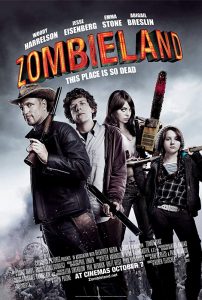 So, okay, Woody Harrelson versus the zombiepocalypse. There’s no chance I was not going to love this movie. Calibrate accordingly.
So, okay, Woody Harrelson versus the zombiepocalypse. There’s no chance I was not going to love this movie. Calibrate accordingly.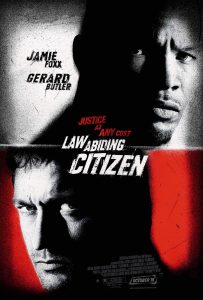
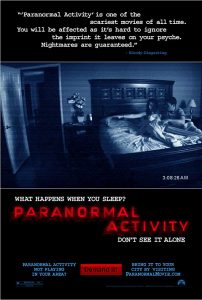 On Thursday, I had never heard of
On Thursday, I had never heard of